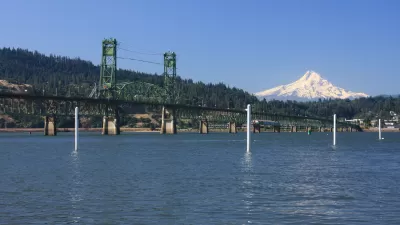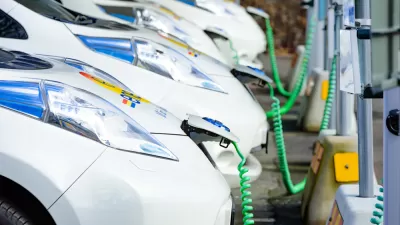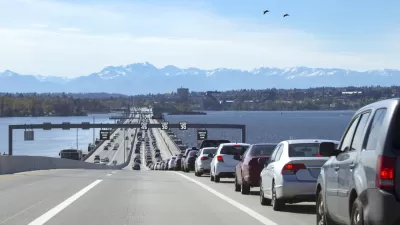After Gov. Kate Brown signs the comprehensive funding package, Oregon will be the eighth state this year to approve legislation to increase its gas tax and the first ever to add a bike tax to fund bike and pedestrian infrastructure.

[Updated 7/12/2016] After a contentious but productive session, including passage of a comprehensive transportation bill, HB 2017, which will raise $5.3 billion over 10 years, the Oregon legislature adjourned July 7, three days before its deadline.
"A 4-cent gas tax hike, $16 vehicle registration fee increase and 0.1 percent payroll tax and 0.5 percent tax on new car sales will kick in next year, provided opponents don't get the question referred to the ballot or overturned in court," reports Gordon R. Friedman for The Oregonian. "Some have said they will try."
Gov. Kate Brown, who named a highway deal as one of her three biggest priorities, tweeted that she looks forward to signing it.
After the initial tax increase, the tax will be raised "2 cents per gallon every two years until 2024 for a total increase of 10 cents per gallon," reports Whitney M. Woodworth of the Statesman Journal. The state gas tax is currently 31.13 cents per gallon, last increased in 2011 by six cents per gallon.
West Virginia was the seventh state to pass a gas tax increase this year.
The nation's first bike tax
Oregon has added another "first" in terms of transportation funding, sealing the Beaver State's reputation as the nation's leader in terms of transportation user fees.
- 1919: Oregon passes first per-gallon gasoline tax.
- July 1, 2015: Oregon implements first road usage charge, aka vehicle miles traveled fee, of 1.5 cents per gallon, though limited to 5,000 volunteers.
- July 6, 2017: With passage of House Bill 2017 by the state senate, the nation will soon have the first state bicycle tax.
Jonathan Maus, publisher and editor-in-chief of BikePortland.org, takes the news of the bike tax from here:
- It’s a $15 flat tax instead of the 4-5% tax initially proposed.
- Applies to new bicycles with a wheel diameter of 26-inches or larger and a retail price of $200 or more.
- Funds will go into the Connect Oregon program and be set aside specifically, “for the purposes of grants for bicycle and pedestrian transportation projects… that expand and improve commuter routes for nonmotorized vehicles and pedestrians, including bicycle trails, footpaths and multiuse trails.” [See ODOT].
So there you have it. We are taxing the healthiest, most inexpensive, most environmentally friendly, most efficient, and most economically sustainable form of transportation ever devised by the human species.
He has more to write on the bike tax and the bill here and here.
A variable vehicle registration fee based on fuel economy.
"Vehicle registration will be priced on a tiered system, where owners of fuel-efficient and electric cars pay more, since those cars contribute little or nothing to gas tax revenues," writes Friedman. Here's the fee schedule from the Statesman Journal:
CAR REGISTRATION FEES: Raises the basic fee to $56 and adds sums based on miles per gallon beginning in 2020:
-- For vehicles that have a rating of 0-19 MPG, $18
-- For vehicles that have a rating of 20-39 MPG, $23.
-- For vehicles that have a rating of 40 MPG or greater, $33
-- For electric vehicles [EV fee], $110.
HB 2017 also adds a retail sales tax on motor vehicles of .5% with funds applied toward rebates of $2,500 for electric vehicles [EVs] and $1,500 for hybrid vehicles. It adds a .10 percent payroll tax to fund public transit statewide.
Supermajority threshold
Like some other states, tax increases need to pass by a supermajority in Oregon. According to the bill's overview, it provides "for revenue raising that requires approval by a three-fifths [60%] majority," though less onerous than California's two-thirds majority.
"With the political splits right now that requires one GOP vote in each chamber," emailed Frieman. However, the bill received bipartisan approval in both chambers, exceeding the required threshold [65% in House and 73% in Senate] unlike the partisan legislative vote on April 6 in California for SB 1 that squeaked by without a vote to spare.
FULL STORY: Big win for legislative leaders as $5.3 billion transportation plan clears final hurdle

Study: Maui’s Plan to Convert Vacation Rentals to Long-Term Housing Could Cause Nearly $1 Billion Economic Loss
The plan would reduce visitor accommodation by 25,% resulting in 1,900 jobs lost.

North Texas Transit Leaders Tout Benefits of TOD for Growing Region
At a summit focused on transit-oriented development, policymakers discussed how North Texas’ expanded light rail system can serve as a tool for economic growth.

Using Old Oil and Gas Wells for Green Energy Storage
Penn State researchers have found that repurposing abandoned oil and gas wells for geothermal-assisted compressed-air energy storage can boost efficiency, reduce environmental risks, and support clean energy and job transitions.

Private Donations Propel Early Restoration of Palisades Playground
Los Angeles has secured over $1.3 million in private funding to restore the Pacific Palisades playground months ahead of schedule, creating a modern, accessible space that supports community healing after recent wildfires.

From Blight to Benefit: Early Results From California’s Equitable Cleanup Program
The Equitable Community Revitalization Grant (ECRG) program is reshaping brownfield redevelopment by prioritizing projects in low-income and environmental justice communities, emphasizing equity, transparency, and community benefits.

Planting Relief: Tackling Las Vegas Heat One Tree at a Time
Nevada Plants, a Las Vegas-based nonprofit, is combating the city’s extreme urban heat by giving away trees to residents in underserved neighborhoods, promoting shade, sustainability, and community health.
Urban Design for Planners 1: Software Tools
This six-course series explores essential urban design concepts using open source software and equips planners with the tools they need to participate fully in the urban design process.
Planning for Universal Design
Learn the tools for implementing Universal Design in planning regulations.
Ascent Environmental
Borough of Carlisle
Institute for Housing and Urban Development Studies (IHS)
City of Grandview
Harvard GSD Executive Education
Toledo-Lucas County Plan Commissions
Salt Lake City
NYU Wagner Graduate School of Public Service





























